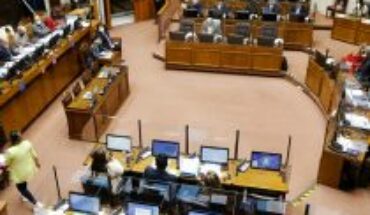The Observatory of Politics and Social Networks of the Central University (UCEN) stressed that opinions among people are divided regarding the approval or disapproval of the new constitution proposal. In this same context, they emphasize that during the previous government of Sebastián Piñera the need arose to create a new constitutional text under the context of a social explosion.
Almost two years have passed to date after the national plebiscite held in October 2020, and perceptions towards the work of the convention have not been free of criticism, despite the high expectations of the constituent process expressed in the high participation of the plebiscite with 50.9% and the numerous approval of the new constitution with 78.27%. However, the first week of the publication of the draft constitutional, the situation changed considerably by lowering its approval. According to the Survey Cadem, a Chilean market research and public opinion company, 37% approve of the draft, 17% are undecided and 46% oppose its publication.
And while it is true that the different conjunctural episodes have favored, in part, negatively to the evaluation of the convention, it is also correct to identify which part of the conversation generates that the process is being misconverted. In this sense, from the UCEN observatory, in its report entitled “First draft and the Constitutional Convention: its impact on the Digital Political Territory”, they detail that there is a strong influence of messages that do not directly allude to the draft itself or to the work that has been given in the different commissions, but rather, focuses on conjunctural issues or even “political showbiz”.
According to the broadcast of the conversation, Internet users negatively value the convention with 49%, however, only 3% refer to or talk about the draft, while 97% only report on the convention.
“The reason for this phenomenon is due to the controversies and controversies in which the constituents have been involved since the beginning of the process, situations such as that of Rojas Vade contributes to the doubt of the quality of the constituents and, therefore, of the writing. Likewise, the extension of the deadline for publication or the extraordinary commission held in the city of Antofagasta, these are events that have contributed to the increase in distrust towards institutions, disbelief that should be reduced with the creation of the draft, “they point out from the Observatory of Politics and Social Networks of the UCEN.
As for the most mentioned topics in the conversation of the digital political territory were fundamental rights with 1.3%, where they rejected the health and pension system, while 0.5% of democracy referred to the right to property, concluding with 0.5% in the justice system alluding to children’s rights.
In summary, with the publication of the draft, social networks were activated, where the most mentioned terms within the conversation about the convention are the following:
In the context of the most mentioned topics, four words stood out, such as, “Draft”, “New”, “Rejection” and “Constitutional”. Along the same lines, it was evident how the first word is the most alluded to because there is conversation about voting informed, reading the draft. Also, there is little difference in conversation between what is approved and rejected. Regarding the above, “a conjecture can be made about what the September plebiscite will be like, where a narrow difference is expected at the polls.”
Finally, the mention of the constituents in the cloud makes a link with what was discussed in image three, since during the process the assessment towards the constituents from the beginning has been negative, obtaining various criticisms in their production and the lack of seriousness in the process, which has been a relevant factor in the fall of their estimate.
Now, the most mentioned words or terms within the draft constitution:
There are the most recurrent terms within the draft constitution, among them are: “Rights”, “Regions”, “Justice” and “Participation”. This is related to the demands of the population, the social rights that the constitution should enshrine, greater autonomy and participation of the regions, justice that has always been in question and, in addition, citizen participation.
In this way, the need is presented after having information on the most mentioned terms, to know the valuation of this draft:
After the delivery of the draft of the new political constitution of Chile to the citizens, Internet users demonstrated with a 47% conversation of neutral tone, that is, they do not hold a position on the subject. In this same framework, a large amount of informative conversation about the process is detected or simply to instruct people about what is being talked about, for example, in days of deliberation on the draft using the hashtag #nuevaconstitución frequently, the number of neutrals is reflected in the people who still do not take a position for their decision, which may be because they haven’t read the draft or it’s just not of interest to them.
It should be mentioned that, regardless of the discontent of the population towards the constituents, the percentage of acceptance is 39%. While their counterpart is 14%, mainly alluding to the use of profanity and denigration in the direction of the process, in both cases they are flagged by the hashtags #apruebodesalida and exit #rechazo.
Regarding the categorization, with the nine topics that are part of the draft and that were analyzed in the conversation, “others” significantly highlighted that in this case the discussion goes beyond the draft. Therefore, the process is informative, similar to what is analyzed in the percentage of neutrals of the graph of image six. In the same way, the conversation about democracy stands out, which tends to be more common, since it is what the draft raises.
It caught the attention of the Observatory of Politics and Social Networks of the UCEN that highlighted the topic of the environment with 0.4%, since in recent years the subject has been in constant conversation to position itself within the issues of importance. Also, 2.1% mentions the rights of indigenous peoples, where there is a polarization on the subject with a diversity of tweets that support a constitution that includes indigenous peoples in it. However, a portion of the tweets points out that it is a hoax for indigenous peoples.
“Therefore, after the analysis it can be determined that the convention is less valued than the draft, due to the controversies and controversies in which the constituents have been involved since the beginning of the process. Now, the conversation about the new constitution has been broad before and after the draft constitution.”
Within the cloud of words about the new magna carta of the country, highlighted main concepts such as: “I approve”, “Rejection”, “Read” and “All”, it is possible to link these words with the vote that will be generated as a result of the Exit Plebiscite on Sunday, September 4, 2022. Situation in which it is essential that citizens read this new constitution so that they can vote in an informed way. Since, being close to the publication of the second part of the draft, it is necessary to be informed for its better understanding.
It is worth mentioning that, based on the data analyzed, both the government cabinet and President Gabriel Boric issue digital messages regarding the new constituent process. On both sides, there is an approval of the Constitutional Convention process as well as the new constitution.
Within the digital communication of the President of Chile, Gabriel Boric, the concentration of 4% of the issuance of messages related to the work of the Constitutional Convention was evident. Regarding their communication on Twitter, it represents a low percentage of attention. However, its content on this body is varied and mainly its messages are directed to the support of the process and the delivery of various aids from his position as president, managing to obtain 40%. In turn, in this same direction, the president has joined the pedagogical efforts on the constituent work, providing relevant information about the process to the citizens, a situation that is reflected with 24%. Finally, another important point to highlight is the support for the fight against false news and disinformation that have been generated on the work of the constituent body, having 9%, the same work that has been implemented by different conventions.
Likewise, we can highlight the tweet of President Boric that had a greater acceptance and dissemination on the platform, where he refers to the support he gives towards the constituent process and encouraging the cityencourages participation in the instances to debate.
From the portfolios of governments, the constituent communication is not far behind, since the different ministers have dedicated part of their messages on Twitter to the process.
The new mandate of President Gabriel Boric and the establishment of a new ministerial cabinet have had an impact, in a certain way, on the acceptance of the constitutional convention. This is due to the fact that since the creation of the commissions only three of their ministers have dedicated a significant percentage (compared to the rest) to talk about the constituent process before the draft came out.
On the one hand, the Minister of Justice and Human Rights, Marcela Rios, led with 20% with communication about the constituent process, who through her social networks referred to issues, such as, for example, the strengthening and modernization of institutions. He also mentioned the facilitation of access to justice for all from parity and plurinationality.
One of his most important Tweets on the subject relates to one of the milestones of the convention, the first 6 months of work and a message of encouragement and thanks to the leadership of the body at that time.
On the other hand, the Minister of Cultures, Arts and Heritage, Julieta Brodsky, obtained a 12% conversation about the constituent process in her broadcast, where she stressed the importance of the principle of decentralization as well as local knowledge and cultures, which links her directly with the portfolio that she would later assume from the government.
At the same time, one of his most relevant tweets on the social network is related to his participation in conventional work and a show of support for the process.
Finally, with 9%, the Minister of National Assets, Javiera Toro, emphasized collaboration to face the housing emergency and advance in the restitution of indigenous lands.
While in one of his most recent messages on the Constitutional Convention he shows signs of support for the process from an informative function, rejecting the use of fake news to delegitimize the body and the results of it, in that tweet he links his message to the words of the president.
However, there were five ministers who stayed out of the constituent work, going so far as not to publish or comment on the process, including Mario Marcel, Minister of Finance, part of the political committee of the Boric government.
Follow us on





